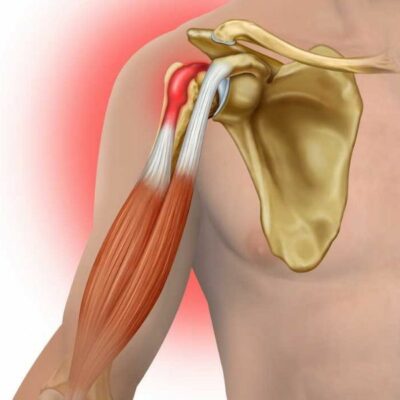Biceps Tendinitis as a Cause of Chronic Shoulder Pain
What is Biceps Tendinitis?
Shoulder biceps tendinitis is inflammation in the main tendon that attaches the biceps muscle to the shoulder. Common among athletes, where extra strain is placed on the biceps tendon, the inflammation can cause chronic shoulder pain. James Mazzara, MD, shoulder specialist, serving patients in Manchester, South Windsor, Enfield, Glastonbury and surrounding Hartford communities, has extensive experience in helping athletes who experience biceps tendinitis.
What are the Symptoms of Biceps Tendinitis?
- Deep ache in the front and/or top of the shoulder
- Shoulder pain when raising the arm or extending the arm in front of the body
- Throbbing or pain radiating toward the elbow when touched
- Weakness when twisting the arm or bending the elbow
- Snapping or slipping sensation when moving the shoulder joint
How is Biceps Tendinitis Diagnosed?
A physical examination of the shoulder is often the most helpful when diagnosing biceps tendinitis. The location of shoulder pain, range of motion and discovering which movements cause pain or weakness, help Dr. Mazzara to determine the correct plan of treatment. An in-office ultrasound may reveal damage to the tendon, abnormal fluid around the tendon or even a rupture or dislocation.
What are Biceps Tendinitis Treatment Options?
Non-surgical
Biceps tendinitis is typically treated non-surgically with ice, rest and anti-inflammatory medication. Dr. Mazzara may recommend a corticosteroid injection in more severe cases where patients are experiencing intense shoulder pain for an extended duration. Injections are administered with the help of an ultrasound to assure the medicine reaches the correct point in the shoulder to have the greatest benefit.
Surgical
When non-surgical treatments for biceps tendinitis do not alleviate pain, shoulder specialist, Dr. Mazzara and his orthopedic team may recommend arthroscopic shoulder surgery. In some cases, the tendon is damaged and needs to be removed. The remaining tendon is reattached to the upper arm bone in a procedure called biceps tenodesis. Once the painful or damaged part of the tendon is removed from the shoulder, pain is alleviated, and patients can resume normal activities.
Occasionally and in more severe cases where the biceps tendon cannot be repaired, a shoulder treatment called biceps tenotomy may be recommended. This procedure involves the release of the damaged biceps tendon from its attachment site and is recommended for less active patients.
For additional information on biceps tendinitis, or to learn more about arthroscopic shoulder surgery to alleviate chronic shoulder pain, please contact the office of Connecticut shoulder specialist, James Mazzara, MD.
